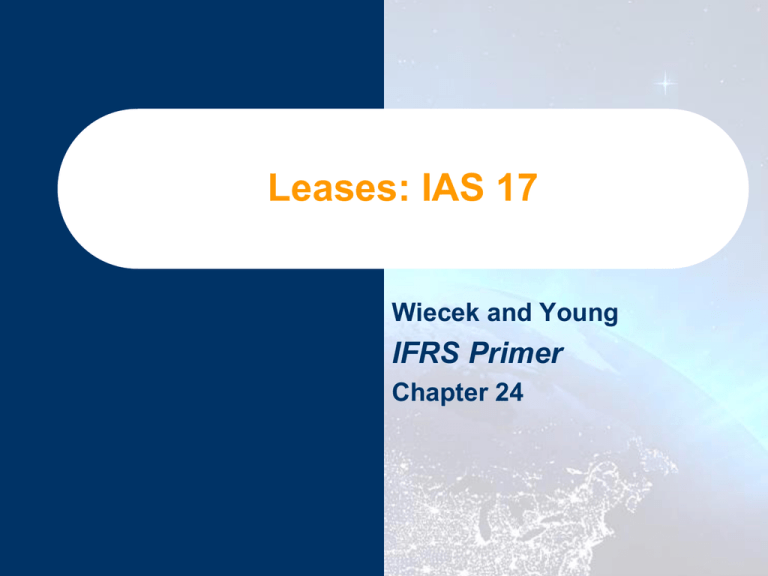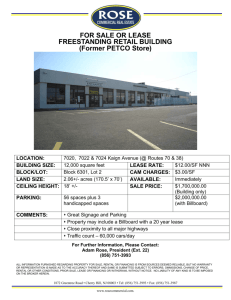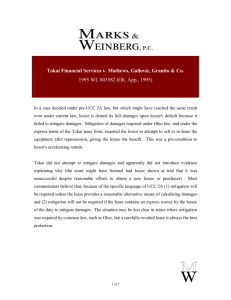
Leases: IAS 17
Wiecek and Young
IFRS Primer
Chapter 24
Leases
2
Related standards
IAS 17
Current GAAP comparisons
IFRS financial statement disclosures
Looking ahead
End-of-chapter practice
Related Standards
3
FAS 13 Accounting for leases
Related Standards
4
IAS 16 Property, plant and equipment
IAS 36 Impairment of assets
IAS 38 Intangible assets
IAS 40 Investment property
IAS 41 Agriculture
IAS 17 – Overview
5
Objective and scope
Classification of leases
Recognition and measurement by the lessee
Recognition and measurement by the lessor
Sale and leaseback transactions
IAS 17 – Objective and Scope
Accounting and disclosure policies
–
–
Excludes leases
–
–
6
lessees
lessors
for exploration and use of non-renewable natural
resources
licensing agreements for many intangible assets
(movies, video recordings, plays, manuscripts,
etc.)
IAS 17 – Classification of Leases
A lease is an agreement in which a lessor
conveys the right to use an asset for an
agreed time to a lessee in return for
payment(s).
Lease classification
–
–
Decision
–
7
finance lease
operating lease
whether risks and rewards of ownership are
transferred from lessor to lessee
IAS 17 – Classification of Leases
8
Risk and rewards incidental to ownership
transferred = finance lease
Risks and rewards not transferred =
operating lease
Use judgment to evaluate individual
circumstances and conditions
IAS 17 – Classification of Leases
Classification as a finance lease supported
by
–
–
–
–
9
ownership transferred by end of lease term –
could be by bargain purchase option
lessee receives most of economic benefit of asset
(consider lease term)
lessor obtains a return of investment in asset and
a return on investment (consider PV of lease
payments relative to asset’s fair value)
asset is specialized to lessee’s needs, costly to
modify for other use
IAS 17 – Classification of Leases
Might lead to classification as a finance lease
–
–
–
10
lessee bears lessor’s losses from lease
cancellation
changes in asset’s fair value accrue to lessee at
end of lease
lease term extendible at much less than market
rate at end of lease
IAS 17 – Classification of Leases
If not a finance lease, then is an operating
lease
Special issues when land and building are
leased together and title is not transferred:
–
–
–
11
land lease cannot be a finance lease; building
lease can be
if value of leased interest in land is immaterial,
treat as building
if material, allocate payments between land and
building based on relative values of leased
interests in each
IAS 17 – Classification of Leases
Minimum lease payments (MLP) –lessee’s
definition
1.
2.
3.
12
payments over the lease term that the lessee is
required to make, excluding contingent rent,
costs for services and taxes to be paid by and
reimbursed to the lessor
if applicable, the payment required to exercise a
“bargain purchase” option
amounts guaranteed by the lessee or party
related to the lessee
IAS 17 – Recognition and
Measurement by the Lessee
Finance lease accounting
–
–
–
13
recognize as acquisition of an asset and incurring
of a liability
after acquisition, asset depreciation policies are
those in IAS 16 or IAS 38
lease payments are split between interest,
principal and operating-type costs, if applicable
IAS 17 – Recognition and
Measurement by the Lessee
Finance lease disclosures
–
–
–
–
–
–
14
net carrying amount by class of asset
MLP and the PV of MLP due within 1 year;
between years 2 and 5; and beyond 5 years from
B/S date
reconciliation of total of MLP to the PV of the MLP
contingent rents expensed in period;
sublease payments expected in future
information about leasing arrangements,
purchase options, contingent rents, restrictions
IAS 17 – Recognition and
Measurement by the Lessee
Operating lease accounting
–
Operating lease disclosures
–
–
–
–
15
expense over lease term, usually on a straightline basis
total future MLP due within 1 year, between years
2 and 5; and beyond 5 years from B/S date
sublease payments expected in future
expense recognized in period for each of MLP,
contingent rents, sublease payments
information about leasing arrangements,
purchase options, contingent rents, restrictions
IAS 17 – Recognition and
Measurement by the Lessor
Classification decision
–
–
–
16
same as for lessee, but using lessor definition of
MLP
if risks and rewards of ownership are transferred
to lessee – remove asset from lessor’s accounts
if risks and rewards retained by lessor, asset
remains in lessor’s accounts
IAS 17 – Recognition and
Measurement by the Lessor
Lessor uses different definition of minimum
lease payments (MLP)
–
–
–
17
the payments over the lease term that the lessee
is required to make, excluding contingent rent,
costs for services and taxes to be paid by and
reimbursed to the lessor
if applicable, the payment required to exercise a
“bargain purchase” option
any residual value guaranteed by a party not
related to the lessor
IAS 17 – Recognition and
Measurement by the Lessor
Finance lease - lessor could be either
–
–
18
a manufacturer or dealer in business to earn a
gross profit on the sale of the asset and finance
income to compensate for delayed payment
terms, or
primarily a financial intermediary in business to
facilitate the financing of assets by others and to
earn finance income as its primary source of
income
Situations differ – therefore entries differ
Manufacturer/dealer lessors
Manufacturer/dealer lessors
IAS 17 – Recognition and
Measurement by the Lessor
Manufacturer/dealer lessors
At beginning of lease term
Lease Receivable
x
Sales
Unearned Finance Income
Cost of Goods Sold
x
Inventory
To record the lease transaction.
19
Throughout lease term
x
x
x
Cash
x
Lease Receivable
x
To record lease payment received.
Unearned Finance Income
x
Finance Income
x
To recognize finance income earned in
period.
Manufacturer/dealer lessors
IAS 17 – Recognition and
Measurement by the Lessor
Financial intermediary lessors
At beginning of lease term
Lease Receivable
x
Unearned Finance Income
Assets Purchased to Lease
To record the lease transaction.
20
x
x
Throughout lease term
Cash
x
Lease Receivable
x
To record lease payment received.
Unearned Finance Income
x
Finance Income
x
To recognize finance income earned in period.
Manufacturer/dealer lessors
IAS 17 – Recognition and
Measurement by the Lessor
Lease receivable = gross investment in the lease:
–
undiscounted total of MLP + bargain purchase option, if
applicable, + guaranteed and unguaranteed residual values
by non-related parties, if applicable
Present value of Lease Receivable = net investment
in lease
Unearned finance income
= gross investment minus net investment
= finance income to be earned over lease term
21
Manufacturer/dealer lessors
IAS 17 – Recognition and
Measurement by the Lessor
Other measurement issues
–
–
–
22
–
initial direct costs of manufacturer/dealer: deduct
as expense in period sale is recognized
initial direct costs of financial intermediary: add to
carrying amount of asset and use lower interest
rate to recognize finance income
for manufacturer/dealer with unguaranteed
residual amount: reduce Sales and Cost of Sales
by PV of unguaranteed residual – no other
changes
review residual values regularly
Manufacturer/dealer lessors
IAS 17 – Recognition and
Measurement by the Lessor
Disclosures by lessors for finance leases
–
–
–
–
23
–
gross investment in lease, PV of MLP due within
1 year, years 2 to 5, and after year 5 from B/S
date
reconciliation between gross investment and PV
of MLP at B/S date
unearned finance income, unguaranteed residual
values, allowance for uncollectible MLP
receivable
contingent rent income
information about material leasing arrangements
Manufacturer/dealer lessors
IAS 17 – Recognition and
Measurement by the Lessor
Accounting for operating leases:
–
–
–
–
24
Leased assets remain on B/S
Recognize lease income on straight-line basis
over lease term
Add initial direct costs to leased asset and
depreciate over lease term on same basis as
lease income is recognized
Depreciation and impairment covered by IAS 16,
38 and 36
Manufacturer/dealer lessors
IAS 17 – Recognition and
Measurement by the Lessor
Disclosures for operating leases:
–
–
–
25
Total MLP due within 1 year, between years 2
and 5, and beyond year 5
Contingent rental income recognized
Description of leasing arrangements
Manufacturer/dealer lessors
IAS 17 – Sale and Leaseback
Transactions
26
Entity owns asset
Sells it and leases it back
Decision by seller-lessee: finance lease or
operating lease?
Sale and leaseback are interdependent
transactions
IAS 17 – Sale and Leaseback
Transactions
Leaseback is a finance lease
–
–
27
Gain on sale is deferred
Amortized to income over term of lease
IAS 17 – Sale and Leaseback
Transactions
Leaseback is an operating lease
–
–
–
–
–
28
Sale made at FV - recognize gain or loss in
current income
Sale < FV and lease payments are at FV –
recognize loss in current income
Sale < FV and lease payments are lower to
compensate – defer loss & amortize on same
basis as lease payments
Sale > FV excess over FV is deferred and
amortized over period of expected use
If FV < carrying amount, impairment; recognize
loss currently
Current GAAP Comparisons
29
Pages 21 to 23 of 49 of
http://www.ey.com/Global/assets.nsf/Internati
onal/IFRS_US_GAAP_vs_IFRS/$file/US_GA
AP_vs_IFRS.pdf
Pages 124 to 127 of 164 of
http://www.kpmg.co.uk/pubs/IFRScomparedt
oU.S.GAAPAnOverview(2008).pdf
IFRS Financial Statement
Disclosures
The Nestlé Group
http://www.nestle.com/Resource.axd?Id=24E5A5E2-93F8-43A3956E-0F259448CB90
Accounting policy for leased assets
Note 11, PP&E note
Note 28, lease commitments
30
Page 21 of 118
Page 37 of 118
Page 73 of 118
Looking Ahead
31
No short-term changes expected
IASB & FASB have longer-term joint project
IASB tentative decision – move away from
risks and rewards of ownership criterion
Replace with defining assets as “right to use
the leased asset” and obligation to make
payments as a liability
Looking Ahead
32
Effect – all non-cancellable lease
agreements may be recognized as assets
and liabilities, including what are now
operating leases
Approach affected by current project on
conceptual framework
Exposure draft expected 2010
New lease standard expected 2011
End-of-Chapter Practice
24-1 Lessee Corp. entered into a non-cancellable agreement with Lessor Corp.
on May 15, 2008 to lease equipment manufactured by Lessor according to
Lessee’s specifications. If Lessee had purchased the equipment outright from
Lessor, it would have cost Lessee $100, although Lessor’s cost was only $80.
The following information is available:
Lease term
May 15, 2008 – May 14, 2012
Economic life of equipment
6 years
Annual rental payment
$25.8
1st payment due
May 15, 2008
Estimated residual value, unguaranteed
$13
Interest rate implied in lease
10%
Title transfer in lease?
No
n = 4, i = 10:
PV factor, lump sum
0.68301
PV factor, annuity due
3.48685
Lessee and Lessor Corp. year ends
December 31
33
End-of-Chapter Practice
34
24-1 Instructions (round all amounts to one decimal place)
a)
Discuss the nature of this lease to Lessee Corp.
b)
Discuss the nature of this lease to Lessor Corp.
c)
Prepare Lessee Corp.’s entries for 2008 and 2009 assuming the lease is classified as:
( i) a finance lease
(ii) an operating lease
d)
Prepare Lessor Corp.’s entries for 2008 and 2009 assuming the lease is classified as:
( i) a finance lease
(ii) an operating lease
e)
Explain how your answers to parts (a) and (b) above would change, if at all, if the following
additional features were added to this lease agreement. Assume each feature is an
independent case. In addition, explain how any entries in parts (c) and (d) would differ, if at all,
from those prepared above.
( i) the lessee’s incremental borrowing rate is 12%
(ii) the residual value is guaranteed by Lessee Corp.
(iii) the residual value is guaranteed by a third party not related to Lessee Corp.
(iv) the agreement contains an option permitting Lessee Corp. to purchase the leased asset
on May 14, 2012 for $4
(v) the equipment is so specialized to Lessee Corp.’s needs that Lessor Corp.’s only option at
the end of the lease term is to sell off the component parts for the estimated residual value
End-of-Chapter Practice
24-2 Prepare a decision chart or diagram to
accompany IAS 17 that can be used by sellerlessees to determine the correct accounting for gains
and losses on disposal of an asset that is sold and
leased back. Write a brief explanation of why the
standard provides a reasonable treatment in each
situation.
35
End-of-Chapter Practice
24-3 Jamal Corp. enters into a four-year operating lease for the
rental of two floors of a new building, and makes a payment of
$2 in advance to hold the space. The monthly rental is $10 and
Jamal qualifies for a special promotion, getting the last four
months of the lease rent-free.
Instructions
a)
Determine the rent expense to be recognized each year of
the four-year lease.
b)
Prepare the journal entries to record the $2 payment, the
$10 rental payment for months 1 and 2 of the lease, and
any entries required in each of months 45, 46, 47 and 48.
Round the monthly rent expense to one decimal place.
36
End-of-Chapter Practice
24-4 On June 30, 2008 Lor Ltd., a lessor, enters into a six-year non-cancellable finance lease
that requires annual rental payments of $100 beginning June 30, 2008. In addition, the lessee
is required to make payments in advance of $12 each year to Lor Ltd. to cover a maintenance
agreement on the equipment. The equipment has an estimated residual value of $40 at the
end of the lease term. Lor Ltd. is a dealer that ordinarily sells this equipment inventory which
cost $450, for $524.50. Lor Ltd. expects to earn an 8% return on any delayed payment terms.
Instructions
a)
Assuming the lessee has guaranteed the residual value, prepare Lor Ltd.’s entries on
June 30, 2008, December 31, 2008 (its year end) and June 30, 2009. Identify the
lessor’s gross investment in the lease and the net investment in the lease on December
31, 2008, and the profit or loss reported on the lease arrangement for the year that just
ended.
b)
Assuming the residual value is not guaranteed, prepare Lor Ltd.’s entries on June 30,
2008, December 31, 2008 (its year end) and June 30, 2009. Identify the lessor’s gross
investment in the lease and the net investment in the lease on December 31, 2008 and
the profit or loss reported on the lease arrangement for the year that just ended.
Comment on your results in this part compared with your results in part (a).
c)
Explain briefly how initial direct costs of negotiating the lease of $10 would be accounted
for on June 30, 2008 and how this would affect any subsequent entries. You are not
required to make any calculations.
37
End-of-Chapter Practice
24-5 In this chapter, flag icons identify areas where there are
GAAP differences between IFRS requirements and national
standards.
Instructions
Access the website(s) identified on the inside back cover of this
book, and prepare a concise summary of the differences that
are flagged throughout the chapter material.
38
Copyright © 2010 John Wiley & Sons, Inc. All rights reserved.
Reproduction or translation of this work beyond that permitted
by Access Copyright is unlawful. Requests for further
information should be addressed to the Permissions
Department, John Wiley & Sons Inc., 111 River Street, Hoboken,
NJ 07030-5774, (201) 748-6011, fax (201) 748-6008, website
http://www.wiley.com/go/permissions. The purchaser may make
back-up copies for his or her own use only and not for
distribution or resale. The author and the publisher assume no
responsibility for errors, omissions, or damages caused by the
use of these programs or from the use of the information
contained herein.



